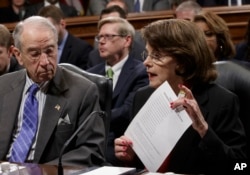The Senate Judiciary Committee delayed action on President Donald Trump's Supreme Court nominee, Judge Neil Gorsuch, as Democrats continued to fume over Republicans' refusal to consider former President Barack Obama's pick for the same vacancy, created by the death of Justice Antonin Scalia more than a year ago.
Democrats exercised their right Monday to put off committee debate and a vote on Gorsuch for one week as partisan divides deepened on the appellate judge and the possibility appeared to grow of a showdown that could trigger a historic change in Senate rules.
The committee's top Democrat, Senator Dianne Feinstein of California, noted that much had transpired since Scalia died in February of last year, adding, "I'm not sure if the majority [Republicans] understands or, if they do understand, cares."
Feinstein said Obama's Supreme Court nominee, Judge Merrick Garland, was highly qualified but couldn't get a hearing when Republicans insisted that no high court nominee be considered during the heat of a presidential election campaign. She then read a long list of justices stretching back to George Washington's presidency who were confirmed in the final year of a presidential term.
"If one is going to look at precedent, one has to look at this piece of paper," Feinstein said, holding up the list. "You can imagine, perhaps, on our side [Democrats], the depth of feeling that came about during this period of time [since Scalia's death] … and yet the decision was made that President Obama would be denied [the nominating rights of] his fourth year [of his second term]."
The committee's chairman, Republican Senator Chuck Grassley of Iowa, sat next to Feinstein but did not respond. At the start of the meeting, he praised Gorsuch as a worthy addition to the Supreme Court.
"We all knew how qualified the judge is," Grassley said. "His resume speaks for itself. But last week [during the confirmation hearings] we got to see up close how thoughtful, how articulate and how humble he is. He's clearly deeply committed to being a fair and impartial judge."
In refusing to consider Garland, Republicans have repeatedly quoted former Vice President Joe Biden who, as a Democratic senator in 1992, argued against filling any Supreme Court vacancy that might arise in the final year of the George H. W. Bush presidency. No such vacancy arose and Biden's words were never acted upon, but Republicans have since argued that Biden's admonition created a precedent for the Senate to follow.
A steady stream of Democrats has announced opposition to Gorsuch since last week's confirmation hearings, most notably Minority Leader Chuck Schumer of New York, who announced his caucus' intention to require three-fifth's backing for a final vote on the nomination in the full chamber, likely next month.
Should Democrats follow through, Republicans, who control 52 seats in the 100-member Senate, would need eight Democrats to join them to advance Gorsuch. Or, as the majority, Republicans could change Senate rules to eliminate the filibuster for Supreme Court nominees, allowing Gorsuch and all who follow to be confirmed by simple majority votes.
A rules change has been called "the nuclear option," as it would alter the very nature of the Senate, a body that historically has afforded the minority party the ability to thwart or delay the will of the majority.
Democrats themselves changed the rules in 2013 when they controlled the chamber, eliminating the filibuster for all presidential nominees other than Supreme Court picks. In doing so, they facilitated the confirmation of Obama's nominees, which Republicans continually filibustered at the time.
That change in rules has made it easier for Republicans to confirm Trump's cabinet picks to date.





